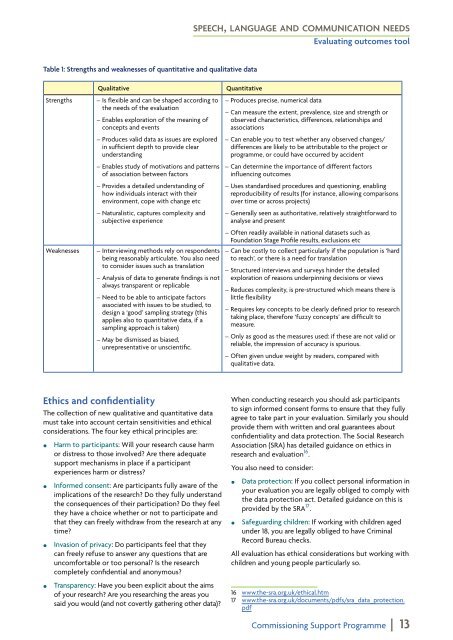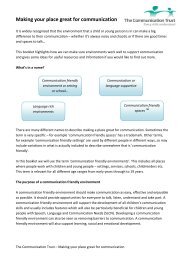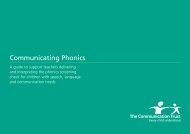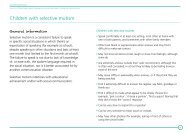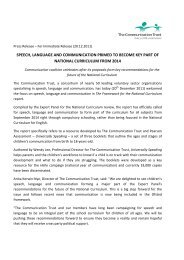Speech, language and communication needs: Evaluating outcomes ...
Speech, language and communication needs: Evaluating outcomes ...
Speech, language and communication needs: Evaluating outcomes ...
You also want an ePaper? Increase the reach of your titles
YUMPU automatically turns print PDFs into web optimized ePapers that Google loves.
speech, <strong>language</strong> <strong>and</strong> <strong>communication</strong> <strong>needs</strong><br />
<strong>Evaluating</strong> <strong>outcomes</strong> tool<br />
Table 1: Strengths <strong>and</strong> weaknesses of quantitative <strong>and</strong> qualitative data<br />
Qualitative<br />
Strengths ––<br />
Is flexible <strong>and</strong> can be shaped according to<br />
the <strong>needs</strong> of the evaluation<br />
––<br />
Enables exploration of the meaning of<br />
concepts <strong>and</strong> events<br />
––<br />
Produces valid data as issues are explored<br />
in sufficient depth to provide clear<br />
underst<strong>and</strong>ing<br />
––<br />
Enables study of motivations <strong>and</strong> patterns<br />
of association between factors<br />
––<br />
Provides a detailed underst<strong>and</strong>ing of<br />
how individuals interact with their<br />
environment, cope with change etc<br />
––<br />
Naturalistic, captures complexity <strong>and</strong><br />
subjective experience<br />
Weaknesses ––<br />
Interviewing methods rely on respondents<br />
being reasonably articulate. You also need<br />
to consider issues such as translation<br />
––<br />
Analysis of data to generate findings is not<br />
always transparent or replicable<br />
––<br />
Need to be able to anticipate factors<br />
associated with issues to be studied, to<br />
design a ‘good’ sampling strategy (this<br />
applies also to quantitative data, if a<br />
sampling approach is taken)<br />
––<br />
May be dismissed as biased,<br />
unrepresentative or unscientific.<br />
Quantitative<br />
––<br />
Produces precise, numerical data<br />
––<br />
Can measure the extent, prevalence, size <strong>and</strong> strength or<br />
observed characteristics, differences, relationships <strong>and</strong><br />
associations<br />
––<br />
Can enable you to test whether any observed changes/<br />
differences are likely to be attributable to the project or<br />
programme, or could have occurred by accident<br />
––<br />
Can determine the importance of different factors<br />
influencing <strong>outcomes</strong><br />
––<br />
Uses st<strong>and</strong>ardised procedures <strong>and</strong> questioning, enabling<br />
reproducibility of results (for instance, allowing comparisons<br />
over time or across projects)<br />
––<br />
Generally seen as authoritative, relatively straightforward to<br />
analyse <strong>and</strong> present<br />
––<br />
Often readily available in national datasets such as<br />
Foundation Stage Profile results, exclusions etc<br />
––<br />
Can be costly to collect particularly if the population is ‘hard<br />
to reach’, or there is a need for translation<br />
––<br />
Structured interviews <strong>and</strong> surveys hinder the detailed<br />
exploration of reasons underpinning decisions or views<br />
––<br />
Reduces complexity, is pre-structured which means there is<br />
little flexibility<br />
––<br />
Requires key concepts to be clearly defined prior to research<br />
taking place, therefore ‘fuzzy concepts’ are difficult to<br />
measure.<br />
––<br />
Only as good as the measures used: if these are not valid or<br />
reliable, the impression of accuracy is spurious.<br />
––<br />
Often given undue weight by readers, compared with<br />
qualitative data.<br />
Ethics <strong>and</strong> confidentiality<br />
The collection of new qualitative <strong>and</strong> quantitative data<br />
must take into account certain sensitivities <strong>and</strong> ethical<br />
considerations. The four key ethical principles are:<br />
• Harm to participants: Will your research cause harm<br />
or distress to those involved? Are there adequate<br />
support mechanisms in place if a participant<br />
experiences harm or distress?<br />
• Informed consent: Are participants fully aware of the<br />
implications of the research? Do they fully underst<strong>and</strong><br />
the consequences of their participation? Do they feel<br />
they have a choice whether or not to participate <strong>and</strong><br />
that they can freely withdraw from the research at any<br />
time?<br />
• Invasion of privacy: Do participants feel that they<br />
can freely refuse to answer any questions that are<br />
uncomfortable or too personal? Is the research<br />
completely confidential <strong>and</strong> anonymous?<br />
• Transparency: Have you been explicit about the aims<br />
of your research? Are you researching the areas you<br />
said you would (<strong>and</strong> not covertly gathering other data)?<br />
When conducting research you should ask participants<br />
to sign informed consent forms to ensure that they fully<br />
agree to take part in your evaluation. Similarly you should<br />
provide them with written <strong>and</strong> oral guarantees about<br />
confidentiality <strong>and</strong> data protection. The Social Research<br />
Association (SRA) has detailed guidance on ethics in<br />
research <strong>and</strong> evaluation 16 .<br />
You also need to consider:<br />
• Data protection: If you collect personal information in<br />
your evaluation you are legally obliged to comply with<br />
the data protection act. Detailed guidance on this is<br />
provided by the SRA 17 .<br />
• Safeguarding children: If working with children aged<br />
under 18, you are legally obliged to have Criminal<br />
Record Bureau checks.<br />
All evaluation has ethical considerations but working with<br />
children <strong>and</strong> young people particularly so.<br />
16 www.the-sra.org.uk/ethical.htm<br />
17 www.the-sra.org.uk/documents/pdfs/sra_data_protection.<br />
pdf<br />
Commissioning Support Programme | 13


